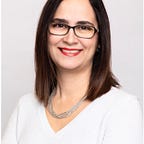The journey to regain my medical degree when I immigrated to Canada
I had just finished medical school at the best University in Brazil and concluded residency in Physiatry at the largest hospital in Sao Paulo. I was ready to start my academic career as an Assistant Professor at the University of Sao Paulo and private practice to see my own patients.
But then, I left all of this behind. Closed the private office that I had just opened. Said no to an opportunity to become a professor of Medicine. And the worst part had to say goodbye to my parents, family and friends.
My husband and I had been approved to immigrate to Canada. I had to make a decision. Do I give up everything or do I try to start all over again? But I did not want to carry this question in my head for the rest of my life “What would have happened if we had immigrated to Canada?” So, we packed two suitcases, put everything else in a storage area and flew to Canada on a Winter day in December 1997.
In Brazil, when you say that you did your medical school at USP, everyone looks as if you are the smartest person on earth. It is the most competitive medical school in Brazil. It is public and you don’t have to pay a penny to get your medical degree.
In Canada, nobody knows what USP is. My diploma is not recognized in Canada, I could not work here as a physician. At least one good thing came out of it, nobody would find out I am a nerd. But on the other hand, when someone asked me “What do you do?” What should I answer? “Well, I was a physician in Brazil, but here I am not”. How do you start a new career, in a different language, without knowing where to go? I never really thought about giving up and going back. I really wanted to give my best and stay here. The main reason was for my future generations, giving my children a chance to grow up in a better place.
Reentry into medicine took nine years
I did not just sit and waited until someone knocked on my door and offered me a job. No. I worked hard, connected with a very large group of people, published many scientific papers, attended various conferences, signed up for graduate school and obtained a Ph.D. degree in Clinical Epidemiology at the University of Toronto, which is considered among the top 10 medical schools in the world.
The key to my successful reentry
The key to my successful reentry was to find the right mentors, people who guided me on this journey, mostly women who had similar careers as me, immigrants, with poor command of English when they arrived in Ontario and mothers of young kids. Their persistence and excellence inspired me to keep fighting.
When I was offered a position at the University of Toronto as Assistant Professor of Medicine, this opened the door for me to regain my medical license and practice in Ontario. I was fearful. It had been nine long years since I had not examined a patient. All these nine years I had been working as a researcher, in a pain clinic at the university and at the research institute. But I was always helping the doctors to collect their data from patients, watching lectures, attending rounds, but it was a different thing to have my own license number now. I questioned my own skills. Do I still remember how to examine a patient? Do I know how to write a prescription in English? How do I use this dictation system to write my medical notes?
Reentry was not easy, but I am grateful that my boss and medical director of the hospital where I would work knew that I was rusty and they offered me to go back to school and do a clinical fellowship to upgrade my skills. I was 37 years of age and going back to the University to do a 2-year clinical fellowship, with two small kids at home, and no family around to help to drop off and pick them up from daycare.
My clinical fellowship was amazing.
I have a lot of good memories. The nurses were extremely patient with me, they explained to me how to do the day-to-day work and made me feel very welcome. The technicians and secretaries were my best allies. The residents passed me all study materials, books, and DVDs with videos for me to watch to refresh my physical exam skills. At that time there was no YouTube yet. The other physicians were very understanding of my limitations and explained to me everything that I needed to know.
I was almost 40 years of age when I could practice medicine again, in a different country, speaking a different language, in a different context. It was all worthwhile. I would do it all over again. I do not have any regrets. And I am glad I chose to immigrate with my husband because I would never know what would have happened if I had said no to immigration.
Visit my YouTube channel to hear more about the work that I do. https://www.youtube.com/c/DrAndreaFurlan
